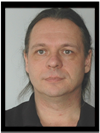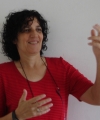|
Conference Chairs
Burkhard Rost, Conference Chair, Technical University Munich, Germany
Michal Linial, Conference Vice-chair, The Hebrew University of Jerusalem, Jerusalem, Israel
Peter Schuster, Honorary Co-chair, University of Vienna (Professor Emeritus), Vienna, Austria
Kurt Zatloukal, Honorary Co-chair, Genome-Austria Tissue Bank, Medical University of Graz, Austria  His major research contribution has been the combination of machine learning tools and evolutionary information. His academic research goal is to contribute toward the understanding of molecular evolution; his technical objective is to contribute toward a coarse-grained modeling of a cell. Current research focuses on the prediction of protein function from sequence and structure and structure prediction. It includes the prediction of subcellular localization, of protein-protein and protein-substrate interactions, the prediction of impacts of residues mutations, the analysis of protein networks, the development of a dynamic view of the protein sequence/structure universe, the development of improved alignment algorithms, and the development of software systems that meet today’s challenges.  Michal Linial is a Professor of Biochemistry, Molecular Biology and Bioinformatics at the Hebrew University of Jerusalem, Israel, where she heads The Sudarsky Center for Computational Biology. She is a founder (1999) and the chair of the undergraduate and graduate joint programs in Computer science and Life Science at the Hebrew University. Michal Linial is a Professor of Biochemistry, Molecular Biology and Bioinformatics at the Hebrew University of Jerusalem, Israel, where she heads The Sudarsky Center for Computational Biology. She is a founder (1999) and the chair of the undergraduate and graduate joint programs in Computer science and Life Science at the Hebrew University.She received her PhD from the Hebrew University's Medical School (1986) in Biochemistry and Molecular Biology. During her post-doctoral training in Stanford University, she engaged in molecular neuroscience with the goal of deciphering the molecular makeup of the synapse. She joined the Hebrew University (1989) and was a driving force in merging computational and analytical tools with classical wet biology. Her laboratory is active in the two arenas - She leads a wet lab as well as a computational group. Her research interests span a broad range of topics such as stem cells, neuronal differentiation, synapse regulation, cell biology of secretory systems and the molecular mechanisms that underlie behavior. With the maturation of large-scale technologies, she has become involved in developing methods for target selection in Structural Genomics, protein family classification and the development of methodologies for the analysis of large-scale biological data sets. She is particularly interested in introducing powerful computational tools to meet the needs of the biological and bio-medical research communities. Among the web tools developed by her research group are PANDORA, ProtoNet, and EVEREST. One of her main recent areas of activity is proteomics where she combines experimental, technological and computational work. She is the current Chair of the European Conference in Computational Biology, and a member of the steering committee of RECOMB. She is a member of ISCB's Board of directors, and is active in the Conference and Education committees and a liaison to the ISCB Student councils.
Peter Schuster Webpages: www.tbi.univie.ac.at/~pks/  Dr. Kurt Zatloukal is Professor of Pathology at the Medical University of Graz with specialisation in molecular pathology, focusing on metabolic and neoplastic diseases, mainly of the liver. He was a member of the Bioethics Commission at the Austrian Federal Chancellery and is the Austrian representative in the OECD task force on biological resource centres and the Roadmap Working Group of the European Strategy Forum on Research Infrastructure. Currently he coordinates the preparatory phase of BBMRI and leads the work on pre-analytical standards for tissue banking in the FP7 large integrated project SPIDIA. Additionally, he acts as member of the executive steering committee of the P3G consortium. In context of the Austrian Genome Programme (GEN-AU), he coordinates a Biobank project which is based on a comprehensive collection of diseased and healthy tissues representing a non-selected central European population. Dr. Kurt Zatloukal is Professor of Pathology at the Medical University of Graz with specialisation in molecular pathology, focusing on metabolic and neoplastic diseases, mainly of the liver. He was a member of the Bioethics Commission at the Austrian Federal Chancellery and is the Austrian representative in the OECD task force on biological resource centres and the Roadmap Working Group of the European Strategy Forum on Research Infrastructure. Currently he coordinates the preparatory phase of BBMRI and leads the work on pre-analytical standards for tissue banking in the FP7 large integrated project SPIDIA. Additionally, he acts as member of the executive steering committee of the P3G consortium. In context of the Austrian Genome Programme (GEN-AU), he coordinates a Biobank project which is based on a comprehensive collection of diseased and healthy tissues representing a non-selected central European population.
Webpages:
|
19th Annual International Conference on
Intelligent Systems for Molecular Biology and
10th European Conference on Computational Biology
Intelligent Systems for Molecular Biology and
10th European Conference on Computational Biology


 was born in Vienna in 1941. He studied chemistry and physics at Vienna University. In the year 1967 he received his PhD in chemistry and then worked as PostDoc researcher with Manfred Eigen at the Max-Planck-Institute for Biophysical Chemistry in Göttingen (Germany). Afterwards, in 1973, he returned to Vienna where he became full professor of Theoretical Chemistry at Vienna University. In the years 1992 – 1995 he took a leave of absence from Vienna and was founding director of the Institute for Molecular Biotechnology in Jena (Germany). Since 1990 he is a member of the external faculty of the Santa Fe Institute in Santa Fe (U.S.A.). He is member of the German Academy of Sciences Leopoldina
was born in Vienna in 1941. He studied chemistry and physics at Vienna University. In the year 1967 he received his PhD in chemistry and then worked as PostDoc researcher with Manfred Eigen at the Max-Planck-Institute for Biophysical Chemistry in Göttingen (Germany). Afterwards, in 1973, he returned to Vienna where he became full professor of Theoretical Chemistry at Vienna University. In the years 1992 – 1995 he took a leave of absence from Vienna and was founding director of the Institute for Molecular Biotechnology in Jena (Germany). Since 1990 he is a member of the external faculty of the Santa Fe Institute in Santa Fe (U.S.A.). He is member of the German Academy of Sciences Leopoldina